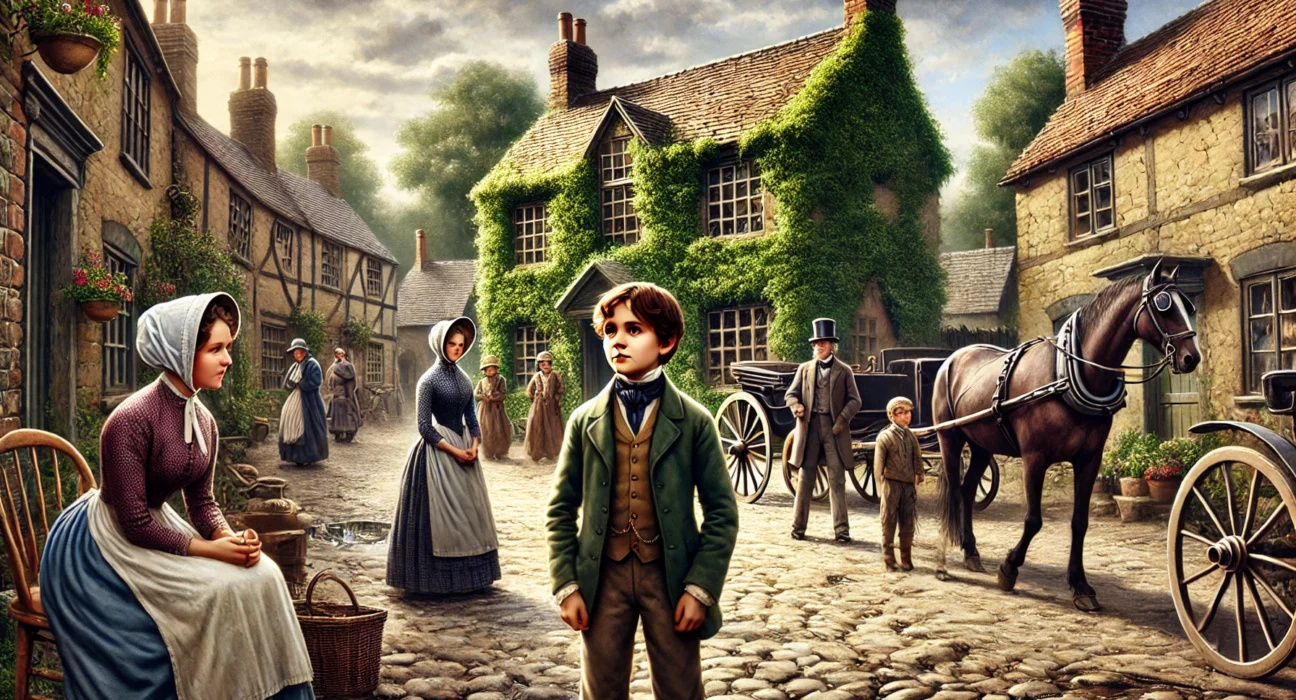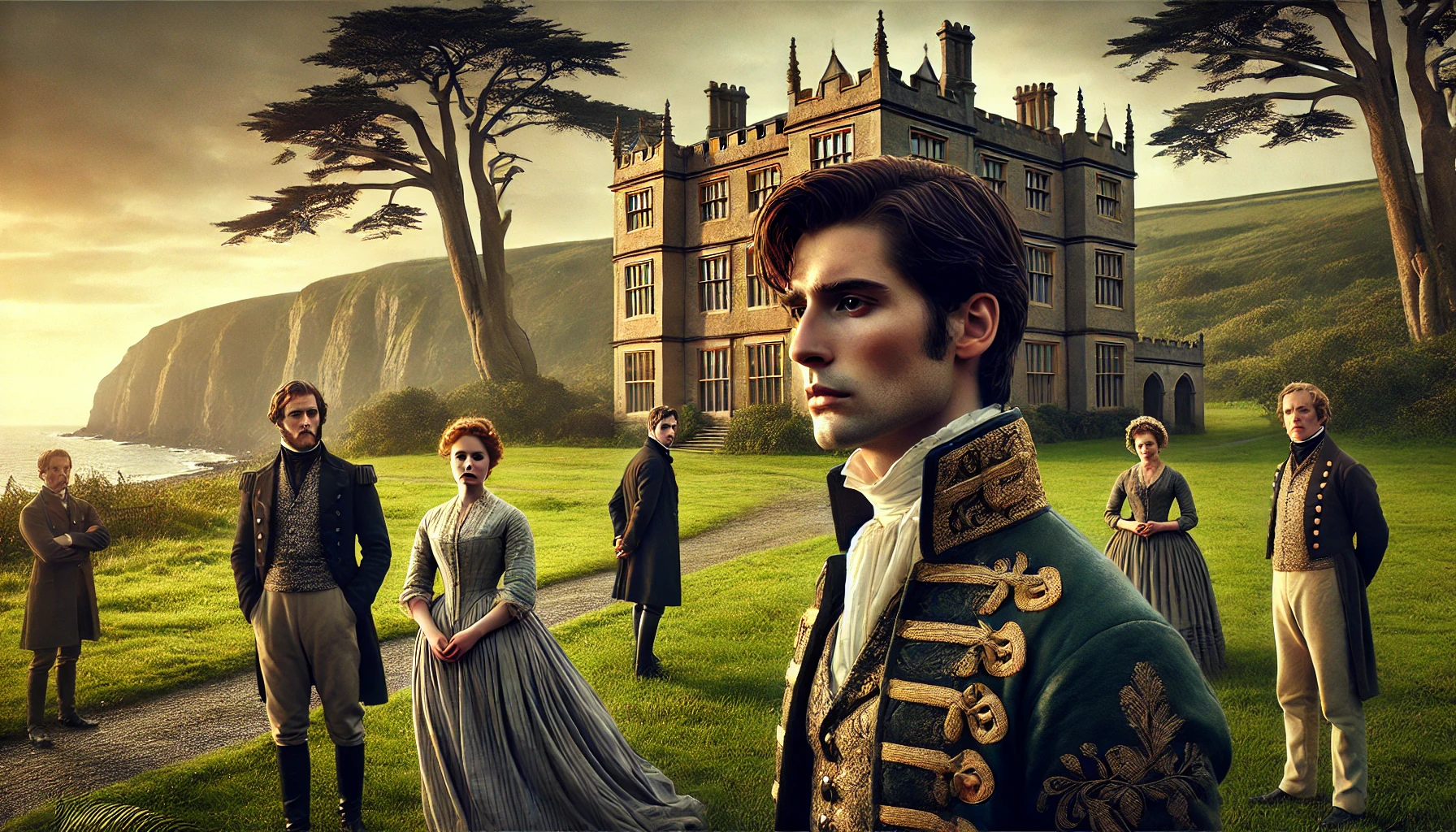David Copperfield, written by Charles Dickens and published in 1850, is a semi-autobiographical novel often considered one of the author’s most personal works. Dickens himself referred to it as his “favorite child” among his novels. The story chronicles the life of David Copperfield from his early childhood through to his maturity, capturing his struggles, relationships, and personal growth. Written in the first person, the novel provides an intimate portrayal of its protagonist’s inner life while also vividly depicting the social and economic realities of 19th-century England.
Plot Summary
David Copperfield is born on a stormy Friday night in Blunderstone, Suffolk. His arrival into the world is marked by grief, as his father has died six months before his birth. David is raised by his doting mother, Clara, and their faithful servant, Peggotty. Clara remarries when David is still very young, and her new husband, Edward Murdstone, quickly brings a sense of dread and tyranny into the household. Harsh and unyielding, Murdstone subjects David to cruel treatment and sends him away to a boarding school called Salem House. Before leaving, David visits Peggotty’s family in Yarmouth, where he forms a bond with her brother, Mr. Peggotty, and his adopted niece, Emily, a beautiful but naive girl with whom David falls in love.
At Salem House, David befriends the charismatic and older James Steerforth, whose charm captivates him. But Steerforth’s influence, though seemingly benign at first, carries the seeds of future heartbreak. After Clara dies under the strain of Murdstone’s control, David’s life changes once again. His great-aunt, Betsey Trotwood, takes him in after his stepfather’s cruelty leaves him destitute. Betsey’s no-nonsense attitude and affection provide the stability David craves, and under her care, he begins to rebuild his life.
Betsey arranges for David to study in Canterbury, where he meets the kindly Mr. Wickfield and his daughter, Agnes. David and Agnes develop a deep friendship, though Agnes’ calm and wise nature stands in contrast to the whirlwind emotions David often experiences. Mr. Wickfield’s clerk, the cunning Uriah Heep, becomes a growing source of unease, with his false humility hiding darker ambitions. Heep is intent on rising to power by manipulating Mr. Wickfield’s financial troubles, and his obsession with Agnes becomes increasingly alarming.
David, meanwhile, pursues his education and apprentices in the legal field. He continues his friendship with Steerforth, unaware of the destruction his friend will soon cause. In a tragic turn, Steerforth seduces Emily, leading her to abandon her family and flee with him. This betrayal shatters the lives of those around them, particularly Mr. Peggotty, who is devastated by Emily’s disappearance. Mr. Peggotty embarks on a long search to bring Emily home, hoping for redemption and reconciliation.
As David matures, he falls in love with Dora Spenlow, a charming and delicate young woman. They marry, but their life together is far from ideal. Dora’s childlike nature and inability to manage household affairs strain their relationship, and though David loves her dearly, he begins to realize that their marriage is built more on youthful infatuation than true compatibility. Dora’s health deteriorates, and she dies, leaving David to reflect on the nature of love and the importance of deeper emotional connections.
In the background of David’s life, Uriah Heep’s manipulations continue. He takes advantage of Mr. Wickfield’s vulnerabilities and seizes control of his business. But Heep’s plans begin to unravel when David’s old friend, Mr. Micawber, who has been employed by Heep, uncovers his fraudulent schemes. Mr. Micawber’s discovery exposes Heep’s treachery, and with the support of Betsey, Mr. Wickfield, and David, they bring Heep to justice. The restoration of Mr. Wickfield’s fortune and reputation brings a sense of closure to this dark chapter.
Through these trials, David’s bond with Agnes deepens. She has been a constant source of support and guidance throughout his life, and as time passes, David begins to recognize his true feelings for her. Agnes’ quiet strength and unwavering love contrast with the fleeting passion he once felt for Dora, and in her, David finds a sense of peace and stability. The two eventually marry, solidifying a partnership that is built on mutual respect and enduring affection.
As David looks back on his life, he reflects on the various people who have shaped his journey. He recalls the painful lessons learned through loss and betrayal but also the profound joy that comes from love, friendship, and personal growth. Mr. Peggotty’s long search for Emily ends in success, as he finds her in a foreign land, remorseful and broken by her choices. They emigrate to Australia, where Emily finds a fresh start, away from the shadow of her past.
David’s career as a writer flourishes, and his experiences—both joyous and sorrowful—infuse his work with depth and meaning. The once insecure and frightened boy has grown into a man who understands that life is a series of trials and triumphs, each contributing to his understanding of himself and the world around him. As he surveys the relationships that have defined him, from the steadfast loyalty of Peggotty to the unconditional love of Agnes, David finds a sense of contentment and fulfillment.
In the end, the characters who populated David’s life have either found redemption or been revealed for their true nature. Steerforth dies in a shipwreck, his life wasted in selfishness and recklessness, while Uriah Heep is consigned to the punishment he so richly deserves. But for David, the future is bright, filled with the promise of love, family, and the wisdom that comes from facing life’s challenges with courage and grace.
Main Characters
David Copperfield – The novel’s protagonist and narrator. David starts as a sensitive, kind-hearted boy who grows into a compassionate and introspective man. His journey is one of personal discovery, shaped by the many hardships and friendships he encounters.
Clara Copperfield – David’s loving but fragile mother. She marries Mr. Murdstone after David’s father dies, and her life becomes one of quiet suffering under Murdstone’s tyrannical control.
Edward Murdstone – David’s cruel stepfather, who imposes strict discipline on both David and his mother. His oppressive and heartless nature deeply scars David’s childhood.
Peggotty – The loyal and loving nurse to David, who remains a constant figure of maternal care in his life. She serves as a surrogate mother after Clara’s passing.
Betsey Trotwood – David’s eccentric, no-nonsense great-aunt. Though she initially rejects David, she eventually becomes his guardian and provides him with stability and guidance.
James Steerforth – A charismatic but morally flawed school friend of David’s. Steerforth represents both charm and corruption, ultimately causing significant harm to those around him, particularly Emily.
Agnes Wickfield – The daughter of Mr. Wickfield and a close friend of David. Agnes represents purity and goodness, providing emotional support to David throughout the novel. She eventually becomes his wife.
Uriah Heep – A conniving and deceitful clerk who rises in power through manipulation. Heep serves as one of the novel’s primary antagonists, symbolizing hypocrisy and greed.
Dora Spenlow – David’s first wife, a beautiful but naive and childish girl. Their marriage, though filled with affection, reveals David’s emotional immaturity and the difficulties of romantic idealism.
Mr. Micawber – A comical yet tragic figure, often in debt but ever hopeful of better fortune. He befriends David and becomes a key player in exposing Uriah Heep’s fraud.
Theme
Personal Growth and Self-Discovery – The novel is a coming-of-age story that follows David’s journey from boyhood to adulthood. His experiences, including his relationships and career, shape his understanding of the world and himself.
Social Class and Ambition – Dickens explores the rigid social hierarchy of Victorian England. Characters like Uriah Heep and Mr. Micawber strive to improve their social standing, with varying degrees of success and ethical compromise.
The Importance of Family – Family relationships are central to the novel, both in terms of their positive and destructive influences. David’s loving relationships with characters like Peggotty and Aunt Betsey contrast sharply with the toxic control of the Murdstones.
Marriage and Romantic Relationships – Through David’s marriages to Dora and Agnes, Dickens examines the complexities of love and companionship. The contrasting portrayals of these two marriages highlight the importance of emotional compatibility and maturity in relationships.
Hypocrisy and Deceit – Uriah Heep, with his false humility, is the embodiment of deceit in the novel. His manipulative rise in the world exposes the dangers of hypocrisy and the lengths people will go to achieve power.
Writing Style and Tone
Dickens’ writing style in David Copperfield is richly descriptive, weaving in detailed character sketches and settings that bring the Victorian world to life. His use of first-person narration allows for a deep exploration of David’s inner thoughts and emotions, making the novel feel intimate and personal. The tone alternates between sentimental and humorous, balancing the tragic moments of David’s life with moments of comic relief. Characters like Mr. Micawber and Aunt Betsey provide levity, even as darker themes of abuse, manipulation, and loss are explored.
Dickens masterfully uses a blend of melodrama and realism, engaging the reader with vivid portrayals of social injustice while also drawing on the emotional core of the story. His narrative is episodic, reflecting the serialized nature of the novel’s original publication, but it maintains cohesion through recurring motifs and character arcs that emphasize growth and transformation.
The novel’s language is accessible yet ornate, typical of Dickens’ style, with memorable dialogue that often reflects the distinct personalities of his characters. His ability to shift tone—from lighthearted to deeply poignant—enhances the emotional depth of the story.
We hope this summary has sparked your interest and would appreciate you following Celsius 233 on social media:
There’s a treasure trove of other fascinating book summaries waiting for you. Check out our collection of stories that inspire, thrill, and provoke thought, just like this one by checking out the Book Shelf or the Library
Remember, while our summaries capture the essence, they can never replace the full experience of reading the book. If this summary intrigued you, consider diving into the complete story – buy the book and immerse yourself in the author’s original work.
If you want to request a book summary, click here.
When Saurabh is not working/watching football/reading books/traveling, you can reach him via Twitter/X, LinkedIn, or Threads
Restart reading!








